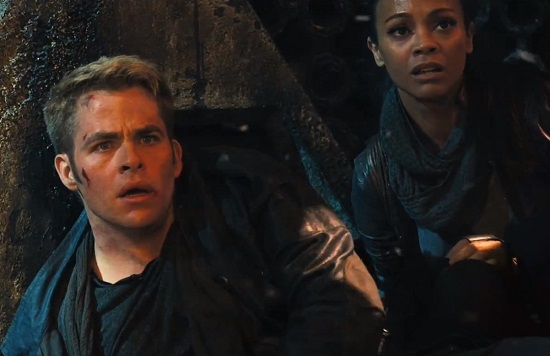The potential audience for any Star Trek film is going to fall broadly into two categories. The first category contains the general cinema-going public, who would not especially classify themselves as Star Trek fans but who might have some fond memories of the programme; mostly, they just want a good time out at the movies. In the second category are those who do describe themselves as Star Trek fans and who have followed and supported Gene Roddenberry’s creation through its many incarnations, even grimly awful ones such as Star Trek: Voyager. Whilst they too are looking for an exciting blockbuster version of the show, they would also like to see a faithful translation of the series’ humanist themes and progressive values.
J.J. Abrams’ strongest attribute as the shepherd of Star Trek‘s cinematic rebirth is that he understands that one of these categories has more people in it than the other.
Like Marvel’s Phase One series of superhero pictures, Abrams has made his Star Trek films highly profitable by taking rich but potentially dense and impenetrable source material and forging it into audience-pleasing movies that pay appropriate respect to their established property. Star Trek Into Darkness, like 2009’s Star Trek, is more concerned with the swashbuckling ideal of the original series than the show’s philosophical underpinnings, favouring action sequences over morality plays – it’s notable that by the conclusion of Into Darkness the USS Enterprise’s famous five-year mission to seek out new life and civilisation is still only just getting started.
With both films Abrams has taken what was most memorable about Star Trek – its spiky character relationships, bold, clean production design, the concept of a young and dynamic crew exploring a perilous, alien-filled universe – and poured it into the mould of a solid modern blockbuster. Into Darkness unquestionably wears Star Trek‘s primary-coloured, tight-fitting clothes, but tonally it has more in common with its fellow summer tentpoles than any episode of the actual programme. Confidently produced and consistently enjoyable, Into Darkness is terrific example of a contemporary blockbuster, but is nevertheless afflicted by the same problems as its peers – being overstuffed, too slick and unnecessarily complicated.
Into Darkness spends much of its running time dealing with the threat of Benedict Cumberbatch’s mysterious John Harrison, but the opaqueness of his actions often leaves the Enterprise’s crew without identifiable goals. The viewer is aware that a long game is in play and that everyone’s true motives are yet to be revealed, but the reality of the script’s incessant mysteries is that Harrison is too abstract of a figure to be sufficiently menacing. Cumberbatch is unsurprisingly great in the role, but in a blockbuster climate lousy with Banes and Lokis, it’s difficult for a verbose British movie villain to stand out.
Given that the novelty of seeing re-imagined versions of the original characters has worn off somewhat, a shift to focusing on a more involved antagonist is sensible, but the film’s emphasis on plotting means it loses a little of the sense of fun that made Abrams’ first outing such a pleasant surprise. Despite its portentous title, Into Darkness largely avoids taking itself too seriously, but it offers little as wonderfully random (and human) as the scene in Star Trek where Scotty (Simon Pegg) meets Leonard Nimoy’s alternate-universe Spock and asks him if people still eat sandwiches in the future. Scotty – off the ship for much of the film – is sorely missed, as is the prickly interplay between Kirk (Chris Pine), Spock (Zachary Quinto) and Bones (Karl Urban). With a mass-murdering enemy to pursue there’s hardly time to bicker, and Into Darkness suffers as a result.
Abrams’ career as a film director has been defined by successfully rebuilding the work of others: Mission: Impossible 3, the two Star Treks, and presumably the forthcoming Star Wars sequels. Even Super 8 – his sole cinematic work not based on an existing property – is a painstaking homage to Steven Spielberg circa 1982. Abrams’ ability to create engrossing, satisfying blockbusters can’t be denied, but people joke about his overuse of lens flare because, in truth, it’s the only distinctive feature of his work. It would be unfair to say that Into Darkness could have been made by anyone, considering the undeniable skill involved, but besides providing continued evidence of his love of a good mystery, there is little to demonstrate why it could have only been directed by J.J. Abrams.
Into Darkness will provide audiences of any description with a good time, but is unlikely to stick with anyone past the closing credits. The film’s source material, for all its faults, at least meant something to its fans. A vehicle for action sequences without years of its own backstory to draw upon, it’s difficult to imagine Into Darkness provoking any sort of devotion; indeed, the film’s only real flat note comes in a climactic scene that deliberately mirrors one of Star Trek‘s most famous moments, where clumsy foreshadowing, absence of dramatic impact and failure to follow through leave it as a depressingly limp reminder of what came before.
Perhaps it’s churlish to complain about something so well-made; certainly we should be grateful that action movies of this level of quality are not only being produced but are commercially successful as well. Even so, watching Into Darkness it’s hard to shake the impression that Abrams is using his directorial aptitude to disguise a lack of passion – his heart doesn’t seem fully invested in the endeavour. He’s putting nothing at risk. Abrams has yet to make a bad film, but he also hasn’t made a truly memorable one yet either. If only he’d apply his ample talents to a project he really cares about. It remains to be seen whether something involving lightsabres will do the trick.


